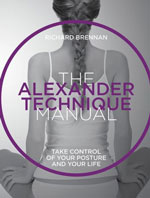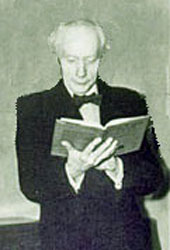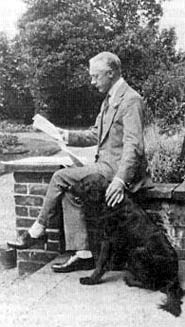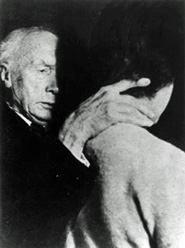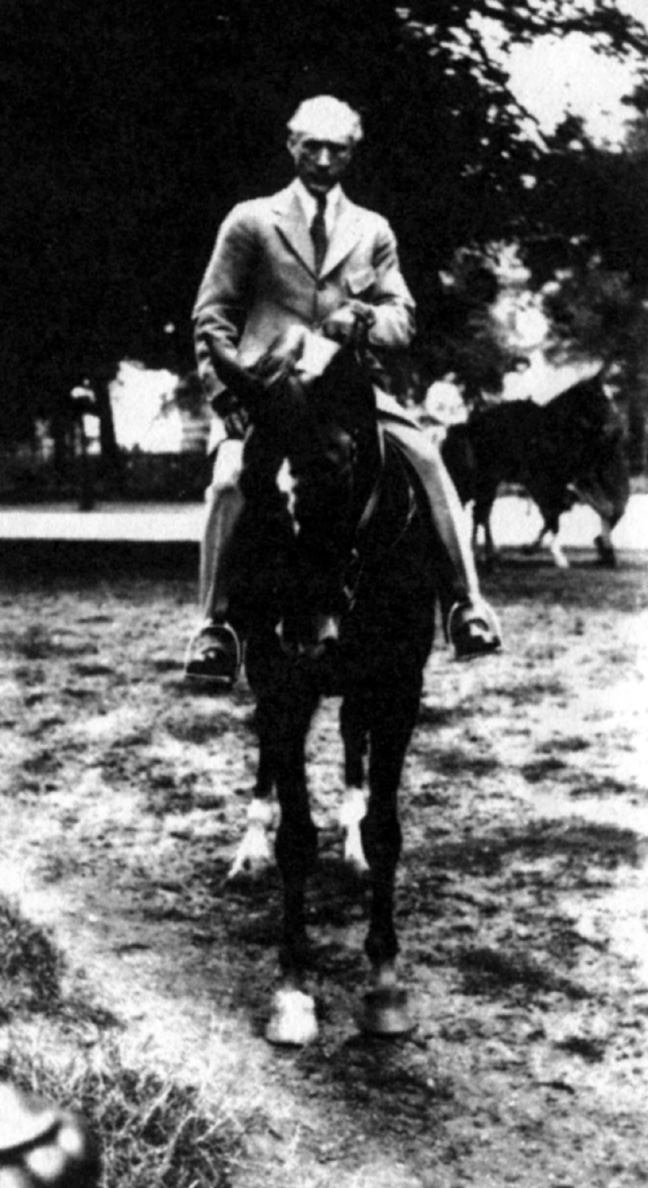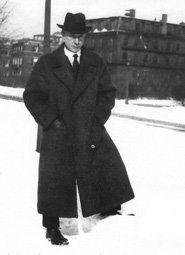History of the Alexander Technique
My technique is based on inhibition, the inhibition of undesirable, unwanted responses to stimuli, and hence it is primarily a technique for the development of the control of the human reaction.
— F. M. Alexander
Frederick Matthias Alexander was born in Australia on 20th January 1869, the eldest of the eight children of John and Betsy Alexander. He grew up in a small town called Wynyard, situated on the north-west coast of the island of Tasmania (Australia).
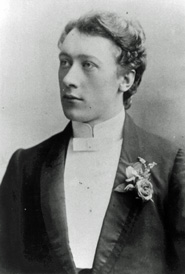
Alexander was a very sickly child, suffering from respiratory problems. Due to his frail health, he was taken away from school at an early age and was tutored in the evenings by the local school-teacher. During his teens Frederick's health gradually improved and he began to take part in some amateur dramatics. At the age of twenty he travelled to Melbourne, where he passed the next three months going to the theatre and concerts and visiting art galleries. At the end of this three- month period Alexander had firmly decided to train to be an actor and reciter.
Voice Problems
It was not long before Alexander gained a fine reputation at a first class reciter, and went on to form his own theatre company specialising in one man Shakespeare recitals. As he became increasingly successful Alexander began to accept more and more engagements and before long his voice started to become hoarse in the middle of his performances. He approached various doctors and voice trainers who gave him medication and exercises, but nothing seemed to make any difference. In fact, the situation deteriorated still further, until on one occasion Alexander could barely finish his recital. He became more and more anxious as he realised that his entire career was in jeopardy. He approached another doctor, who was convinced that the vocal cords had merely been over-strained and prescribed complete rest of his voice for two weeks, promising that this would give Alexander a solution to his problem. Determined to try anything, Alexander rested his voice for the two-week period preceding his next important engagement.
At the beginning of the performance he was delighted to find that his voice was crystal clear; in fact, it was better than it had been for months. This soon turned to dismay, however, when half-way through his performance the hoarseness in Alexander's voice returned, and the condition continued to deteriorate until by the end of the evening he could hardly speak. The next day, feeling very disappointed, he returned to his doctor and reported what had happened. The doctor felt that his treatment had had some effect and advised a longer period of rest for the vocal cords. Alexander then reasoned with the doctor that if his voice was perfect when he started the recital, and yet he could hardly speak by the time he had finished, it must have been something that he was doing while performing that was causing the problem. The doctor thought carefully for a moment and then agreed that this must be the case. Alexander then asked the doctor if he could explain what the root cause of his problem was. The doctor honestly admitted that he did not know.
Alexander left the surgery determined to find a solution to his curious problem. This took him on a journey of discovery that not only gave him the answer to his question, but also revealed the mechanics of movement of the human being and the interference with muscles and reflexes that contributes to much of mankind's suffering in our modern civilisation. Alexander's findings were greatly underestimated at the time, although his discovery has now come to be regarded as one of the greatest of the twentieth century.
Many people reading this may now be thinking that they have no problem with their voice, but instead with their back, neck, shoulders or other parts. Yet Alexander's logic can be applied to practically any ailment we have. For example, if someone has no back pain before they do the gardening, yet has back pain after doing the gardening, then it must follow that they are putting their body under undue stress while digging or weeding and that this is the underlying cause of the problem. It doesn't matter what physical ailment you are suffering from; there is always a reason behind the problem, and when that is removed the pain or discomfort will gradually disappear.
Alexander used a mirror to observe himself both when speaking in his normal voice and again when reciting, to find differences between the two. Eventually he noticed three tendencies: he pulled his head back; he depressed his larynx; he sucked air through his mouth.
Up until this point, Alexander had been completely unaware of these habits, and when he returned to his normal speaking voice he realised that the same tendencies were also present but to a lesser extent, which was why they had previously gone undetected.
He returned to the mirror with new encouragement and recited over and over again to see if he could find any more clues, and soon noticed that the three tendencies became accentuated when he was reading passages in which unusual demands were made on his voice. This confirmed his earlier suspicion that there was definitely a connection between the way in which he recited and his loss of voice. He realised for the first time that he was unconsciously causing his own problem.
Alexander experimented with the movement of his head and soon found that when he prevented himself from pulling his head back the hoarseness in his voice decreased. He returned to his doctor and after further examination it was found that there had been a considerable improvement in the general condition of his throat and vocal cords. He now had positive proof that the manner in which he was reciting was causing him to lose his voice, and changing the way in which he performed would eventually lead to an eradication of his problem.
Faulty Sensory Perception
Enthused with the idea that he was at last getting to the crux of the matter, Alexander experimented still further to see if he could achieve even more improvement in the state of his vocal cords. He did this by deliberately putting his head forward, but was surprised to find that this also had the effect of depressing the larynx. To have a closer look at how he was moving, he added two further mirrors on either side of the original one. When he observed himself again in the mirrors, he could see clearly that he was in fact still pulling his head down on to his spine as before. Alexander was very surprised at these findings, because for the first time he realised that he was doing the exact opposite of what he thought he was doing.
In other words, he could no longer rely on his sensory feeling to tell him what he was or was not doing. At first he thought that this was his own personal idiosyncrasy, but when he started to teach his technique he realised that faulty sensory perception was practically universal. Feeling disillusioned, yet unable to give up his quest, Alexander persevered and began to notice that his habit of pulling his head back was not only causing the depression of his larynx, but also various tensions and stresses throughout his entire body. He started to realise that he was also lifting his chest, arching his back, throwing his pelvis forward, over-tightening his leg muscles and even gripping the floor with his feet. This was affecting his entire posture and balance.
During his recital training Alexander had been taught to 'take hold of the floor' with his feet by one of his tutors. He had obeyed by tensing his feet and toes, believing that his teacher obviously knew better than him. In our society we are told to sit or stand in a certain way in order to correct poor posture. Even if we achieve what we imagine people are asking of us, we can actually be making the situation worse instead of better, because we are under the illusion that other people know what good posture is, when in fact they do not. It dawned on Alexander that the tightening of all the muscles in his legs and feet was part of the same habit that was causing him to tighten his neck muscles. The action of 'taking hold of the floor' with his feet had over the years become such an ingrained habit that he was completely unaware that he was doing it. He found it almost impossible to recite without all his habits being present, and whatever he did to change the way he recited simply increased the tension, which made things worse.
Directions
This led Alexander on to the whole question of how he consciously directed himself while reciting and he realised that he never gave any thought to how he moved, but simply moved in a way that was habitual because this felt 'right' to him. At first he directed himself by an activity, such as putting his head forward and up, but soon found that this once again increased the very muscular tension that he was trying to eliminate. At this point he gave up in exasperation and almost at once achieved the release of tension he had wanted. Alexander realised that he merely had to think of the directions in order to bring about a change without further tension and he began to experiment with being aware and consciously directing the way in which he moved. He described this process as 'Thinking in Activity'.
The meaning of the word 'direction', as Alexander used it, is consciously to give a mental order to your body. The body will then respond to what you tell it to do rather than working by habit alone: for example, when a person realises that their shoulders are hunched they think of releasing the tension and their shoulders immediately drop.
After working on pausing in order to give directions before reciting for some time, Alexander devised his Technique primarily consisting of awareness, eradication of harmful habits and free choice. He found that he was able not only to free himself from the habit which had jeopardised his career, but also to cure himself of the recurring asthma that had afflicted him from birth.
When Alexander returned to the stage, many of his fellow actors who were suffering from similar problems sought his help, and he began teaching his Technique to others. News spread like wildfire about the actor who had cured himself of his vocal and respiratory difficulties and doctors began referring some of their patients to Alexander, who had enormous success in treating a variety of different ailments. He used the gentle guidance of his hands, as well as verbal instructions, to convey his Technique. He helped many people be aware and change the harmful habits which were at the root of their illnesses.
One of the doctors in Australia could see the great potential in his work and persuaded Alexander to go to London in order to bring the Technique to a wider audience. In the spring of 1904 Alexander set sail for London. He arrived later that year and set up a practice in Victoria Street and later at Ashley Place in Central London, and worked there until his death in October 1955.

